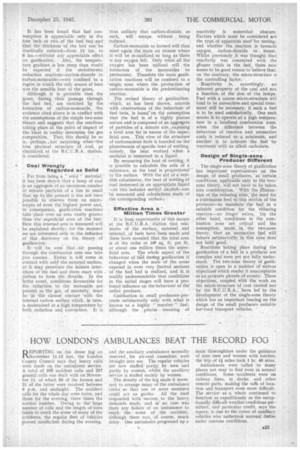HOW LONDON'S AMBULANCES BEAT THE RECORD FOG
Page 35

If you've noticed an error in this article please click here to report it so we can fix it.
DEPORTING on the dense fog on 1N.Novernber 11-12 last, the London County Council says that heavy calls • were made on the ambulance service. A total of 20b accident calls and 267 general calls was dealt with on NovemberII, of which 96 of the former and 21 of the latter were received between 6 p.m. and midnight. The accident calls for the whole day were twice, and those for the evening, three times the normal number. Owing to the' large number of calls and the length of time . taken to reach the scene of many of the accidents, the regula,r fleet of vehicles proved insufficient during the evening, and the auxiliary ambulances normally reserved, for air-raid casualties were brought into use. The regular vehicles are now staffed• partly. by men and partly by women, whilst the auxiliary service is staffed mainly by women.
The density of the fog made it necessary to arrange many of the ambulance crews so that one or more members could act as guides. All the staff responded. with success , to the heavy demands made, and in' no case was there any failure of an ambulance to reach the scene of the accident, although there was, of course, much delay. One ambulance progressed up a main thoroughfare under the guidance of nine men and women with torches; the trip of lf miles took 1 hr. 40 mine.
Ambulances were called to many paces not easy to find even in normal conditions. Some accidents were on railway lines, in docks, and other remote parts, making the task of location and transport even more difficult. The service as a whole continued to function as expeditiously as the exceptionally difficult weather conditions permitted, and particular credit, says the report, is due to the crews of auxiliary vehicles who undertook unusual duties under onerous conditions.




















































